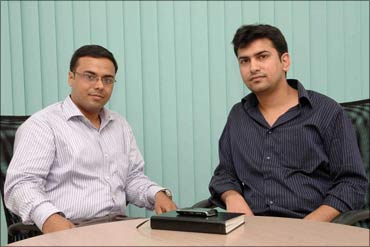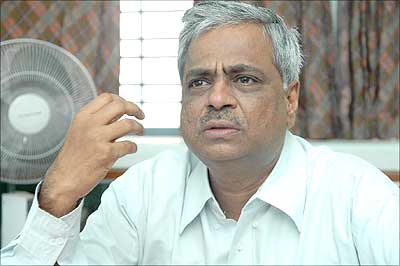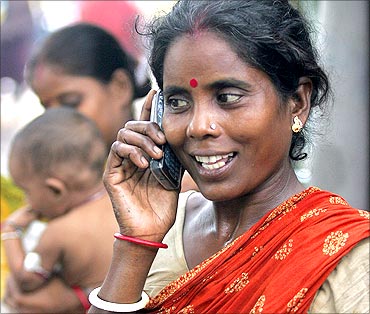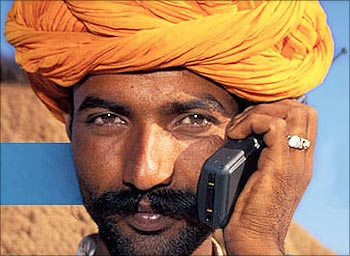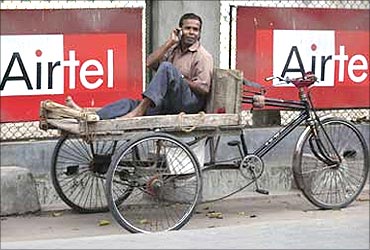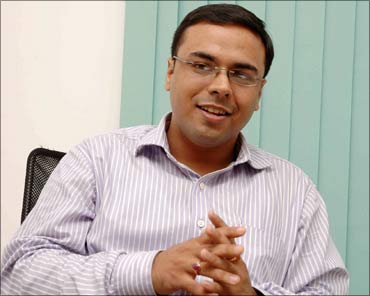 | « Back to article | Print this article |
Working for rural India from IIT research park
Uniphore Software Systems is one of the companies incubated by Rural Technology and Business Incubator (RTBI) of the Indian Institute of Technology-Madras.
The company provides interactive voice-based information service on mobile phones, where the caller speaks, instead of pressing keys.
Speech recognition software is built in several Indian languages. The service for rural India is a unique concept. Today, half a million people in rural India use their platform in varied applications like financial, agro based and FMCG sectors.
Umesh Sachdev, co-founder and CEO of the company, talks about how he and his friend (the other co-founder Ravi Saraogi) moved from Delhi to Chennai and started the company with help from IIT-Madras.
How did you get associated with RTBI of IIT-Madras?
Ravi Saraogi, the other co-founder of the company, and myself were running a venture on mobile space in Delhi. The product that we had developed was to locate stolen or lost items.
We had some problems with the regulations of the Telecom Regulatory Authority of India. So, we landed in Chennai and approached Prof. Jhunjhunwala (of IIT-Madras) for help.
He was impressed with the work that we were doing and asked us whether we were interested in working with him. He said that we would have to shift base to Chennai then. He also said that we could work in the mobile space but our focus had to be rural India.
Click NEXT to read on . . .
Working for rural India from IIT research park
What was your reaction when you were asked to work for rural India? That was not what you were doing then . . .
Yes, that was not what we were doing but we had seen what was being done by some of the initiatives of Prof. Jhunjhunwala. In fact, we also felt that rural India is an unexplored territory. It was a virgin market and there was business opportunity there.
So, we thought it was worthwhile to try it. We knew if it worked, it would work very well as there was not much competition. That was our first thought. This is from a purely business point of view. So, after a bit of deliberation, we (I am from Delhi and Ravi is from Assam) decided to shift base to Chennai. That was in 2007.
Click NEXT to read on . . .
Working for rural India from IIT research park
Did you explore or do any study on the Tamil Nadu rural market before making the decision?
Actually we did a study only after moving to Chennai. The venture was only incorporated in April 2008. During the interim period, we made visits to rural Tamil Nadu -- places like Mayiladudurai, Sirgazhi, Nagapattinam, etc.
We had heard about how mobile phones had conquered rural India, so we wanted to understand for what purpose a person in rural India used his mobile phone.
We found that people used the phone only to talk, and in the local language. So we decided that whatever we had to do was in voice and in the local language!
What we did first was start a small call centre with two people in Chennai. The purpose behind starting a call centre was to find out what kind of information rural Tamil people generally want to know.
Three areas they were interested in were agriculture, jobs and financial services. Based on the study, we built a database fairly successfully.
Click NEXT to read on . . .
Working for rural India from IIT research park
At that time, did you get a fair idea on the software you were going to develop?
We had no idea first. We only knew setting up call centres was going to be expensive and it was impossible to have someone answering all the queries of millions of people.
That was not what we were planning to do. We also tried to use technology to develop computers answer the queries. That was how we evolved into automated voice technology and moved to speech recognition. We found that it is not easy to recognise speech in Indian languages with the Indian dialect.
That's how we entered a joint research with IIT-Madras and in 4-5 months, we got 95 per cent accuracy in speech recognition in Tamil. We created a few dummy applications where a person could call and get information on price, financial data, etc.
Did you decide on the voice platform because rural people used mobile phones for information?
Yes. The primary medium of communication among rural masses is mobile phones and communication is in the local language. What Internet did to urban India, we knew the mobile phone and voice technology could do to rural India.
Click NEXT to read on . . .
Working for rural India from IIT research park
What is the product that you developed?
We had this basic service delivery platform which has speech recognition built in. It could reply to the caller which will be in the local language. It also has voice biometric now.
How long did it take for you to develop the software?
The product is still evolving. . . from code to this level, it took us more than two years.
Was your product unique or were you just working on something that was there in the market?
This is absolutely unique. Till date, whatever we have developed is fairly greenfield and nothing of this sort is there in the market.
Today, we have well-defined solutions and we operate in three broad verticals (agri; fMCG; and banking and financial services) and we have customers in each one of them.
The product provides banking services, payment services and other commerce related services to the end customer. It can also provide an automation piece to rural retail supply chain which is lacking today.
It can also provide people-to-enterprise connect to farmers who really want to connect to the commodity market.
Click NEXT to read on . . .
Working for rural India from IIT research park
How do you deal with the end customers?
We found earlier itself that we can't directly deal with the end customers. So our typical customer is a bank which does not have a branch in a rural area.
With the mobile phone, now a person in a rural area can call the bank to know his balance through our platform.
How many customers do you have now? Are they from any particular part of India?
We have close to 15-16 customers right now and it is pan-India and not confined to Tamil Nadu alone. In Punjab, farmers use it. In Karnataka, it is more used for financial services. In Tamil Nadu, micro-finance units are using it a lot. We have 11 languages now and it is not difficult to add a new language.
In Karnataka alone, 15,000 customers are transacting on our banking platform.
Today, half a million people in India use our platform in varied applications of ours. The growth potential is tremendous.
Click NEXT to read on . . .
Working for rural India from IIT research park
With how much funding did you start the venture?
We first showed the prototypes to IIT and other potential investors. Then, we filed for a joint patent with IIT-M and incorporated the company.
We got seed fund from NRDC, which is a government of India body that does equity funding. In the first 3-4 months, we raised about $100,000 (Rs 40-45 lakh) apart from the incubation support RTBI provided.
That was how the real journey of Uniphore began. By the middle of last year, that is, after one and a half years, we were cash positive and by second year, we were profitable. The turnover now is in early crores. Now, we are looking to scale rapidly and looking for another round of funding.
How did you select a name like Uniphore?
It is from the word Universe. It shows what we want to do - a bunch of services to rural India. We had figured out that the medium will be voice. On that base, we knew we could run N number of things.
Click NEXT to read on . . .
Working for rural India from IIT research park
Does it give you any special satisfaction that you work for rural India?
Definitely. We are a company that aims at profit, for sure. Adding value to our stake holders is one of our main objectives. What we take real pride is, we are providing something that impacts the lives of rural Indians. We are very proud of this.
What are your future plans?
We have maintained a three times growth every year so far which we want to have in the next 2-3 years also. It is possible because there are customers.
